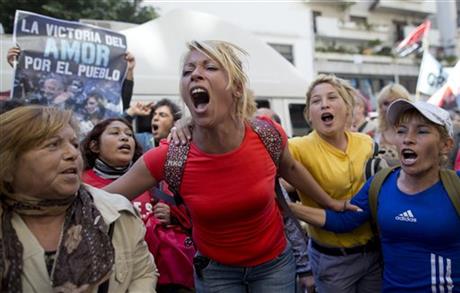
DOCTORS: ARGENTINE PRESIDENT ‘EVOLVING FAVORABLY’
A picture of Argentina’s President Cristina Fernandez hangs outside the Favaloro Hospital where she is undergoing surgery on her skull months after she suffered an unexplained head injury in Buenos Aires, Argentina, Tuesday, Oct. 8, 2013. Fernandez was diagnosed with “chronic subdural hematoma,” or fluid trapped between the skull and brain. Doctors initially prescribed a month’s rest, but decided surgery was required after she complained of numbness and weakness in her upper left arm Sunday. (AP Photo/Natacha Pisarenko)
BUENOS AIRES (AP) — Doctors removed a blood clot pressuring the right side of Argentine President Cristina Fernandez’s brain on Tuesday, relieving pressure that had been giving her headaches and numbness. Their report said she was “evolving favorably” after the surgery, and would remain hospitalized for now.
The president’s spokesman went further as he briefly addressed a crowd of supporters outside the hospital, saying “the operation went very well” and that Fernandez was happily thanking all those who helped her.
“She’s in very good spirits. She’s greeting everyone. She thanked her medical team, she thanks all of you who are praying for her. She’s in very good spirits, so the next medical report will come at mid-day tomorrow,” said Alfredo Scoccimarro.
Buenos Aires Gov. Daniel Scioli, who has announced his bid to succeed Fernandez in 2015, was among many Argentine politicians wishing her a rapid recovery. “If God desires it, she’s going to be back with us very soon, fully functioning.”
Experts described the procedure — drilling through the skull and suctioning out the fluid — as low risk and almost always having positive results, but recovery can take three months or more, and many Argentines have struggled to imagine the country with anyone but the 60-year-old leader at its center.
Many cheered after she emerged from surgery at the Fundacion Favaloro. Some had spent all night holding vigil, carrying statues of the Virgen of Lujan, Argentina’s patron saint, and messages such as “Fuerza Cristina,” urging her to show her strength.
Scoccimarro did not answer questions after his brief announcement on the hospital steps.
Fernandez was diagnosed with “chronic subdural hematoma,” or fluid trapped between the skull and brain. This can happen when the tiny veins that connect the brain’s surface with its outermost covering, or dura, tear and leak blood. As people age, it can happen with a head injury so mild that they don’t remember it.
In the president’s case, doctors initially prescribed a month’s rest, because in some cases the fluid can be absorbed without intervention, but they decided on surgery after she complained of numbness and weakness in her upper left arm, in addition to the headaches and irregular heartbeats she has been suffering.
Amid the messages of sympathy, critics questioned the secrecy surrounding her condition, which was announced in a three-paragraph statement late Saturday after she spent more than nine hours in the hospital. It said she suffered a “traumatismo cranial” on Aug. 12, but gave no details on how this injury happened.
August 11 had been a rough day for the president. Despite her intensive campaigning, primary election results that night showed a significant drop in support for her party’s candidates ahead of the Oct. 27 congressional elections.
Fernandez, who followed her highly popular husband into the presidency, has dominated Argentine politics during her nearly six years in office. Now she’s out of commission just three weeks before voting day.
Her executive powers were formally transferred to Vice President Amado Boudou as she was prepared for surgery, although no document describing the extent of his powers was released, generating a debate over how long he can remain in charge during her recovery without an act of Congress.
Boudou, for his part, told top officials in a televised address that they would run Argentina as a team “while she gets the rest she deserves.”
“What Cristina wants is for us to maintain the administration, and to carry on this project that (her late husband) Nestor Kirchner began and that Cristina has continued,” said Boudou, whose popularity has sunk amid ongoing corruption investigations.
Argentina’s constitution provides for temporary transfers of power in case of health problems, said Daniel Sabsay, a constitutional lawyer. While a full medical leave requires congressional approval, short of that “she alone decides,” he said.
___
Associated Press writer Almudena Calatrava contributed to this report.



